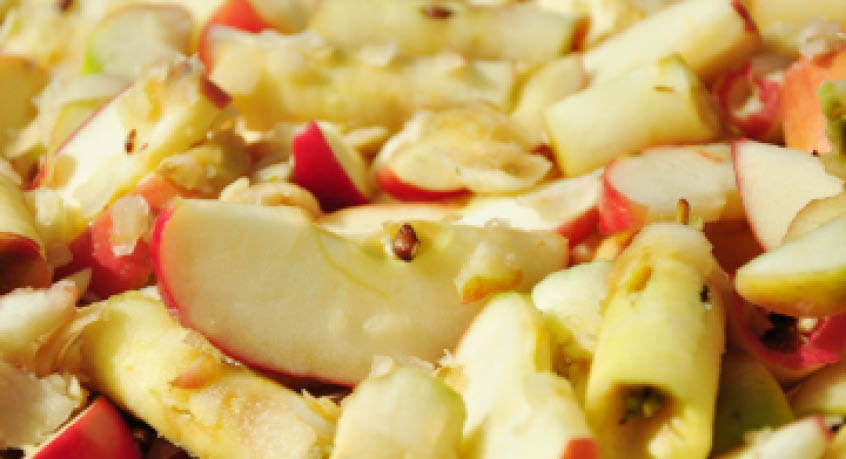An apple a day may keep the livestock veterinarian away. Juice, pulp, and other waste from Empire apples, when injected into chicken eggs before hatching, show signs of boosting the animal’s intestinal health, according to Cornell research.
“Apples are one of the top fruits produced in the United States and we have long been aware of their health benefits,” says lead author Cydney Jackson, a doctoral student in the field of food science. “In our study, we were able to see how an apple — specifically, the Empire apple developed at Cornell in the 1940s — improved the intestinal health of production broilers, and we observed signs for the overall good health of the bird,” Jackson says.
The researchers injected juice, pomace, and pulp — in vivo — into the amniotic fluid of the developing embryo inside a chicken egg. After the eggs were hatched, relevant samples were collected for analyses. Jackson and his team found that introducing apple juice and pomace into the egg can increase the young chicken’s transport system for amino acids, improve the bioavailability of iron, boost the microbial populations in the animal’s large intestine, and support the growth of potentially beneficial gut bacteria.
“Apples are comprised of bioactive constituents such as phytochemicals and prebiotics that could help intestinal health and the gut microbiome,” says Elad Tako, associate professor of food science in the College of Agriculture and Life Sciences and a co-author of the paper.
- 165m Nigerians need treatment for neglected tropical diseases –Survey
- Inside the 3,000-year-old palace of Prophet Daud, Suleyman
Each year, the U.S. sees nearly $20 billion in apple sales, with an estimated 5 million tons of the fruit produced annually in the U.S. within the last decade, according to the paper.
For juice and apple production, about 33.4 million bushels of apples were used in 2021-2022, according to the U.S. Apple Association. Nearly 175,350 metric tons of apple pomace — the fibrous waste — is produced annually and typically tossed away in landfills, according to the paper. This damages the environment, as it disrupts the carbon-nitrogen ratio of soil due to the pomace’s sugar content.
“Pomace is treated like industrial waste now. If we can potentially use the pomace, which is rich in nutrients, we can add it to the diet of broilers,” Tako says. “We can improve the nutrition in their feed and achieve productivity in a more natural way — and potentially reduce the use of added dietary chemicals.”
The researchers say this was an initial study to demonstrate the potential effect for adding apple waste to chicken feed, and they indicated a need for long-term studies.
“Potentially, we’ll be upscaling industrial waste that is currently being discarded. That’s sustainable,” says Tako.
In addition to Jackson and Tako, the co-authors of “Empire Apple (Malus domestica) Juice, Pomace, and Pulp Modulate Intestinal Functionality, Morphology, and Bacterial Populations In Vivo (Gallus gallus)” are Cornell doctoral students Viral Shukla, Nikolai Kolba and Nikita Agarwal; and Olga I. Padilla-Zakour, professor of food science. The funding for the research was provided by USDA’s National Institute of Food and Agriculture.
Source: Successful Farming

 Join Daily Trust WhatsApp Community For Quick Access To News and Happenings Around You.
Join Daily Trust WhatsApp Community For Quick Access To News and Happenings Around You.


